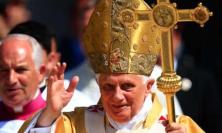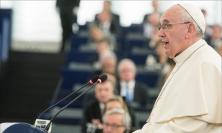As Pray-as-you-go’s Advent programme offers daily reflections based on the themes of Caritas in Veritate, Thinking Faith will explore the issues and challenges raised in Pope Benedict’s latest encyclical. Frank Turner SJ begins our series by introducing the principles that run through the letter and emerge from the consideration of ‘love’ and ‘truth’ in the Pope’s theology.
Pope Benedict XVI issued his third encyclical letter, Caritas in Veritate (‘Love/Charity in Truth’), in July 2009. This long-awaited document was delayed by the Pope’s concern to include a response to the financial, economic and social crisis that broke during 2008. It builds on the teaching of other recent popes (among other things it celebrates the fortieth anniversary of Paul VI’s Populorum Progressio), yet embodies Pope Benedict’s distinctive theological approach. The professed central theme of the encyclical – ‘Integral human development in charity and truth – is of universal concern and relevance.
This first article considers some general aspects of the encyclical: a second article will reflect on some challenges of using it in a secularised European culture.
Caritas in Veritate(henceforth ‘CV’) aspires to reach all these people, being addressed to various categories of Catholics and ‘all people of good will’. (This usage, now standard, was a dramatic innovation of John XXIII’s Pacem in Terris of 1963, published shortly before his death: whereas earlier usage, up to and including John XXIII’s Mater et Magistra (1961) were directed specifically to those ‘in communion with the Apostolic See’.) Cardinal Bertone, the Pope’s secretary of state, has accordingly insisted to the Italian Senate that the CV is directed to believers and non-believers alike: truth ‘is not only vouched for in Biblical revelation, but can also be understood by every person of good will who uses his reason uprightly in reflecting upon himself’.
But the term ‘truth’ has no univocal meaning. Pope Benedict’s ’s first encyclical, Deus Caritas Est, insists that being Christian is ‘not the result of an ethical choice or a lofty idea, but the encounter with an event, a person’: Jesus Christ. Of course this new horizon and the faith that can perceive it is not irrational, but it is also a leap beyond ‘natural reason’, or the truth which natural reason can attain. The Pope often insists, when speaking of the Christian heritage of Europe, on the necessary and enriching complementarity of faith and reason, so that neither alone can lead us fully into truth. It is also true that faith and reason come into sharp tension in Christian revelation itself: as the apostle Paul insists, the cross of Christ is ‘folly to the Greeks’, its wisdom is ‘not of this age’ (1 Corinthians 1 & 2).[1]. This second important truth and its implications are rather little explored by the Pope.
CVbegins with an intricate argument rooted in biblical theology, even Christology, and its later approach to socio-economic problems relies on an explicitly Christian anthropology. More generally, the opening sections show the Pope’s immense intellectual, theological, confidence. As he notes himself (§.2) he finds his title by inverting a phrase from the Letter to the Ephesians, ‘speaking the truth in love’, and then proclaims this coinage to be ‘the principle around which the Church's social doctrine turns’ (§.6), and even ‘the principal driving force behind the authentic development of every person and of all humanity’ (§.1).
The technical theological argument of these first paragraphs has no equivalent in the social encyclicals of Paul VI or John Paul II. Even as reflected in CV §.11, Paul VI’s Populorum Progressio and John Paul II’s Sollicitudo Rei Socialis emphasise the Church’s service of the world, of integral human development, the development of the ‘whole of the person in every single dimension’, rather than the Church’s own mission of truth to the world. Pope Benedict’s fully integrated position will be fully coherent, even crucial, for Christians. But one may doubt whether secular readers will follow the argument to this point.
There is, then, some tension between the readership envisaged for the encyclical and its method of argument. Yet, in any attempt to understand the present global situation in the light of a Christian vision, it is precisely this attempt at coherence that is most enlightening. Perhaps the principal service of the encyclical is to stimulate Christian readers at the level of their own global vision: to ‘make sense’ of our present challenging situation
There are four principles that emerge directly from this careful holding together of ‘love’ and ‘truth’, of revelation and reason: in the elaboration of these principles, I believe, is the primary value of CV.
Principles
1. Anthropology
The Pope notes that ‘the social question has become a radically anthropological question’ (§.75, emphasis in original). He stresses interdependence, transcendence, gratuitousness and freedom:
- He writes, ‘As a spiritual being, the human creature is defined through interpersonal relations. The more authentically he or she lives these relations, the more his or her own personal identity matures’ (§.53, see also §.55). At the societal and global level, ‘the risk for our time is that the de facto interdependence of people and nations is not matched by ethical interaction of consciences and minds that would give rise to truly human development’ (§.9). ‘As society becomes ever more globalised, it makes us neighbours but does not make us brothers’ (§.19).
- Integral human development is a ‘vocation’: but the very notion of vocation implies receptivity to something or someone beyond oneself. For the Pope, it ‘requires a transcendent vision of the person, it needs God’ (§.11). CV goes so far as to argue (§.78-79) that ‘A humanism which excludes God is an inhuman humanism’ (emphasis in original). Naturally this key and stark anthropological claim will hardly be well-received by those ‘people of good will’ who are not theist.
- Part of this transcendence is to recognise ‘the astonishing experience of gift’. Gratuitousness is present in our lives in many different forms, which often go unrecognised because of a purely consumerist and utilitarian view of life. The human being is made for gift, which expresses and makes present his transcendent dimension’ (§.34).
- Freedom, too, flows from transcendence. ‘We must reappropriate the true meaning of freedom, which is not an intoxication with total autonomy, but a response to the call of being, beginning with our own personal being’ (§.70). This conception of freedom is a rejection of certain forms of socialist collectivism, and of any version of liberalism that equates freedom with the primacy of individual choice.
2. Structures, Institutions and Agency
Pope Benedict is highly conscious of social structures. He writes, for example, of the ‘structural causes’ of food insecurity (§.27). When he speaks of ‘life issues’ (§.28) he stresses that legislation shapes moral attitudes and praxis: it is thus not merely the result of moral attitudes and practice. However, he wishes to prevent the acknowledgement of social structures from relieving us of communal moral responsibility. As social scientists might say, he stresses agency. Of globalisation, and quoting John Paul II, he writes that ‘despite some of its structural elements, which should neither be denied nor exaggerated, “globalisation, a priori, is neither good nor bad. It will be what people make of it”. We should not be its victims, but rather its protagonists, acting in the light of reason, guided by charity and truth’ (§.42).
However he avoids, presumably deliberately, the weighty phrase of John Paul II: ‘structures of sin’.[2] This omission leads to the danger that the sheer power of social structures be overlooked: elements that always intersect with each other are needlessly taken to exclude each other. It seems impossible to deny that many people are ‘victims’ of globalisation, even if they succeed in becoming, in some measure, also protagonists. Similarly, the Pope writes: ‘Instruments that are good in themselves can thereby be transformed into harmful ones. But it is man’s darkened reason that produces these consequences, not the instrument per se. Therefore it is not the instrument that must be called to account, but individuals, their moral conscience, and their personal and social responsibility.’ (§.36). To say that ‘it is not the instrument that must be called to account, but individuals’ hints at a false opposition, one which the concept of ‘structures of sin’ precisely helps to avoid.[3] And indeed, the Pope makes proposals about reformed institutions, implying that such institutions are the proper object of our attention and cannot be regarded as the mere logical consequences of the intentions of individuals.
3. Charity and Justice
It is crucial to any ‘social teaching’ to understand justice as itself a form of love, rather than merely as a moral demand somehow subsequent to love.[4] Pope Benedict’s first encyclical, Deus Caritas Est, carefully relates eros and agape to each other, concluding that ‘love’ is a single reality, with different but inseparable dimensions (§.3-8). Now, in CV, he could not be clearer: ‘Charity goes beyond justice, because to love is to give, to offer what is “mine” to the other; but it never lacks justice, which prompts us to give the other what is “his”, what is due to him by reason of his being or his acting. I cannot “give” what is mine to the other, without first giving him what pertains to him in justice. . . . Justice is the primary way of charity’ (§.6). And again: ‘This is the institutional path – we might also call it the political path – of charity, no less excellent and effective than the kind of charity which encounters the neighbour directly, outside the institutional mediation of the pólis’. (§.7).
The Pope infers from this unity of charity and justice the moral obligation of solidarity, which is mentioned no fewer than forty times in the encyclical. Solidarity is required both in the face of the threat posed to social security systems by the pressure of international financial competitiveness (§.25) and by the need for financial support to economically poor countries (§.27). Solidarity, threatened by market forces, is even crucial to the legitimate functioning of the market itself: ‘Without internal forms of solidarity and mutual trust, the market cannot completely fulfil its proper economic function.’ (§.35, emphasis in original). ‘Authentically human social relationships of friendship, solidarity and reciprocity can also be conducted within economic activity, and not only outside it or “after” it’ (§.36).
Economic liberalism prefers to recognise the evil of ‘absolute’ poverty while remaining tolerant of inequality, or even praising its supposedly dynamic influence on market efficiency.[5] But Pope Benedict cites John Paul II, who regarded massive inequalities as an offence against solidarity, and therefore against justice. CV endorses Paul VI’s phrase: ‘the scandal of glaring inequalities’, and observes that ‘the world's wealth is growing in absolute terms, but inequalities are on the increase’ (§.22, emphasis in original). It follows that the poverty of our century is unlike that of any other. It is not, as poverty tended to be in other ages, the unfortunate result of natural scarcity: it results from a set of priorities imposed on world systems by rich countries and rich businesses. CV goes on (§.32) to note that excessive inequalities erode both trust and the social capital (the network of relationships of trust, dependability, and respect for rules) that is ‘indispensable for any form of civil coexistence’.
4. The political and economic realms
Centesimus Annus, in 1991, had attributed to the state ‘the task of determining the juridical framework within which economic affairs are to be conducted, and thus of safeguarding the prerequisites of a free economy, which presumes a certain equality between the parties, such that one party would not be so powerful as to reduce the other to subservience’ (§.15, emphasis added). This position directly confronted the ‘new right’ that was so powerful at the time.[6] The economy is essentially a political matter. Deus Caritas Est goes further, identifying justice as ‘both the aim and the intrinsic criterion of all politics’ (§.28).
In the context of a global crisis, CV is still more specific than Deus Caritas Est. ‘It must be borne in mind that grave imbalances are produced when economic action, conceived merely as an engine for wealth creation, is detached from political action, conceived as a means for pursuing justice through redistribution’ (§.36, see also §.18). This sentence daringly identifies justice through redistribution as the heart of politics, and an essential complement to wealth creation. The Pope acknowledges that the globally inter-related character of the market manifests the limits of state control. But he concludes not that such political control is a chimera, but that supra-state mechanisms of control are essential: ‘the integrated economy of the present day does not make the role of States redundant, but rather it commits governments to greater collaboration with one another’ (§.41).
Politics must intervene to ensure that business serves the common good. But this does not relieve business of its own inalienable responsibility. For ‘justice must be applied to every phase of economic activity. . . Hence the canons of justice must be respected from the outset, as the economic process unfolds, and not just afterwards or incidentally.’(§.37, emphasis in original). Business management must concern itself with the well-being of all stakeholders, not only the proprietors: likewise, investment (§.40). Business activity has a human significance prior to its professional one (§.41).
Having insisted on the responsibilities of the political and business world, the Pope goes on to state the corollary: ‘The exclusively binary model of market-plus-State is corrosive of society, while economic forms based on solidarity, which find their natural home in civil society without being restricted to it, build up society’ (§.39). It is civil society that is best placed to recognise and embody the practice of gratuitousness, and which is the primary locus of solidarity between citizens, even if both government and business must respect this principle.
The principle that liberates the potential of civil society is subsidiarity. ‘Subsidiarity respects personal dignity by recognising in the person a subject who is always capable of giving something to others. By considering reciprocity as the heart of what it is to be a human being, subsidiarity is the most effective antidote against any form of all-encompassing welfare state’ (§.57). (One might add, following on from the previous point, it is also an antidote to the threatened hegemony of the market principle.) This reference to the welfare state is in no way equivalent to the attack on the treacherously ‘socialist’ welfare alleged, for example, by certain opponents of Barack Obama’s health care proposals. The key word in the Pope’s sentence is ‘all-encompassing’. No one can delegate solidarity, responsibility, etc. to the state or to corporations, so as to deny the need for their own contribution, nor must the state reject the contribution of civil society. The principle of subsidiarity returns us to the importance of ‘agency’.
Finally, in this connection, the Pope insists on the Church’s right and responsibility to witness and engage, while respecting the secularity of the political order. In Deus Caritas Est, (§.28), he had written, with great clarity: ‘The Church cannot and must not take upon herself the political battle to bring about the most just society possible. . . . Yet at the same time she cannot and must not remain on the sidelines in the fight for justice. She has to play her part through rational argument and she has to reawaken the spiritual energy without which justice, which always demands sacrifice, cannot prevail and prosper’. Now he insists that ‘God has a place in the public realm, specifically in regard to its cultural, social, economic, and particularly its political dimensions. The Church’s social doctrine came into being in order to claim “citizenship status” for the Christian religion. . . . Reason always stands in need of being purified by faith: . . . for its part, religion always needs to be purified by reason in order to show its authentically human face. Any breach in this dialogue comes only at an enormous price to human development’ (§.56, emphasis in original). As Archbishop Diarmuid Martin expressed the matter in Brussels last year, ‘A pluralist Europe ought not to be secularist, since some varieties of secularism are a clear denial of pluralism: it ought not to be afraid of the Christian contribution’. The anthropology of CV encapsulates this Christian contribution.
Frank Turner SJ is Director of OCIPE, the Jesuit European Office, in Brussels.
[1] I offer a favourite literary example of this tension, Robert Browning’s poem, or ‘dramatic monologue, ‘Cleon’. Cleon, the exemplar of sensitive, open, Greek culture, open even to the transcendent (‘Some future state revealed to us by Zeus / Unlimited in capability / For joy, as this is in desire for joy’) nevertheless contemptuously dismisses the rumour of Jesus:
‘Oh, the Jew findeth scholars! certain slaves
Who touched on this same isle, preached him and Christ;
And (as I gathered from a bystander)
Their doctrine could be held by no sane man.’
[2] Sollicitudo Rei Socialis, §.36: it is not out of place to speak of "structures of sin," which . . . are rooted in personal sin, and thus always linked to the concrete acts of individuals who introduce these structures, consolidate them and make them difficult to remove. And thus they grow stronger, spread, and become the source of other sins, and so influence people's behavior. See also Centesimus Annus,§.9.
[3] The representative of the Holy See at the UN, speaking on food security on 26 October 2009, gives a pertinent example. ‘One must admit that the real power of agriculture today seems to reside not anymore in the hands of farmers, but principally in the stages preceding and following production. Agricultural leadership is in the hands of those who control credit and the distribution of new technology, of those concerned with transport, distribution and sale of products. . . . In this regard, as the current financial crisis demonstrates, efforts must be undertaken to give greater importance to the role of labor and production over capital, financial transactions and speculation.’. In stressing the need for ‘agency’ the Holy See cannot help but identify the overwhelming power of structures
[4] This latter was the position famously proposed by Reihold Niebuhr in Moral man and Immoral Society (first published 1932) and eloquently opposed by Jon Sobrino in The True Church and the Poor (1985). Sobrino insists that justice is a 'primordial and irreducible form of love'. For it implies self-emptying no less than self-assertion, it emphasises service before self-gratification, it expresses the willingness to accept persecution and 'take up one's cross'
[5] For a British writer, the perennial symbol remains Mrs Thatcher’s famous dictum: ‘the point is not to cut the cake fairly but to bake a bigger cake’: a position informed by a quasi-religious faith in ‘trickle-down’ theory.
[6] The influential theorist Friedrich A. Hayek’s best-known book argues that the State's acceptance of the role John Paul II later prescribe for it (that is, that it must take responsibility for social justice) sets society on The Road to Serfdom. On the contrary, Hayek and his liberal or neo-liberal followers take the ‘free market’ to be the principle of social life, and the only ‘neutral one’. John Paul II by contrast, opposed the ‘free-market economy’ to the ‘free economy’.
More on Caritas in Veritate:
![]() Pray-as-you-go
Pray-as-you-go
![]() Frank Turner SJ – ‘To all people of good will’
Frank Turner SJ – ‘To all people of good will’
![]() Michael Czerny SJ – ‘Love thoughtfully!’
Michael Czerny SJ – ‘Love thoughtfully!’
![]() Austen Ivereigh – ‘Building civil society’
Austen Ivereigh – ‘Building civil society’
![]() Brendan MacPartlin SJ on Caritas in Veritate
Brendan MacPartlin SJ on Caritas in Veritate
![]() Caritas in Veritate
Caritas in Veritate![]() OCIPE
OCIPE






